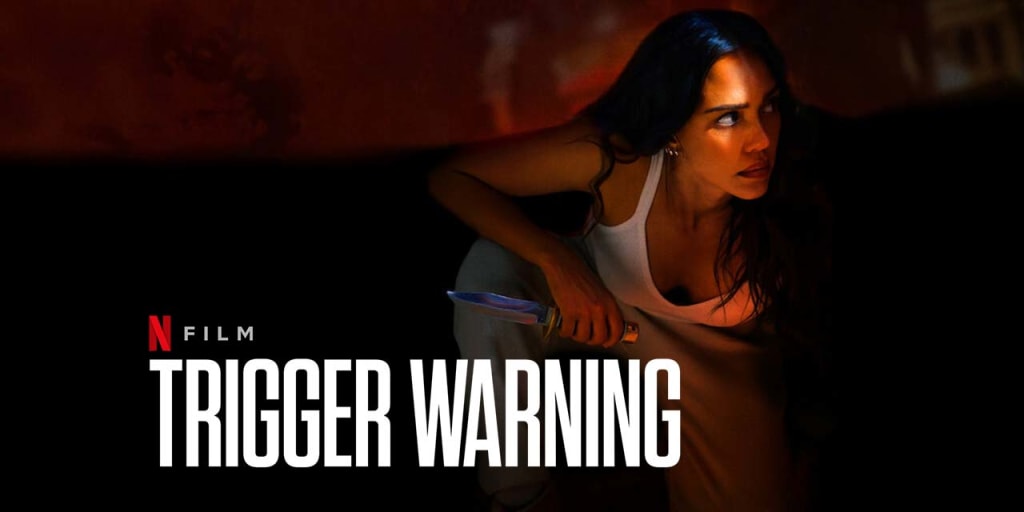Exploring the themes of woman empowerment through Netflix's Trigger Warning
Netflix's Trigger Warning Review

Exploring the themes of woman empowerment through Netflix's Trigger Warning
As we evolve into the changing nuances of contemporary cinema, the stereotypical portrayals of women as passive and nurturing abodes for their masculine figures have seen a new light with female representation as thought-provoking leaders and competent individuals who are no damsels in distress waiting for their saviours. Netflix’s recent movie Trigger Warning, starring Jessica Alibi, is a similar hard-hitting tale. Jessica Alba channels her inner maverick as she plays a serving U.S. military officer who must return home after a tragic incident. Despite the film's excellent craftsmanship, some of its subtleties revert to the same clichés that can be found in other Hollywood productions. Let's examine the themes of women's empowerment that the movie explores in more detail.
The plot of the movie
CIA operative Parker receives news of her father's death in a mining accident while in Syria with her friend Spider. She returns to her hometown in New Mexico, where she investigates the suspicious circumstances surrounding her father's death with the help of her friend Mike. She also confronts Sheriff Jesse Swann's brother, Elvis, and saves a store owner from thieves.
Parker catches Elvis and his group spying and shooting guns on her family's land, leading her to ask Spider to investigate. She discovers that Elvis is a dark web arms dealer for terrorists and meets Senator Ezekiel Swann, who is running for re-election. After Harry's funeral, Parker confronts Elvis' men in the mine, resulting in her bar being burned down and one of the henchmen dying. She is arrested, with Jesse accusing Elvis of using the mine to sell weapons to fund Ezekiel's campaign and help Jesse become sheriff. Despite Jesse being falsely accused of killing Harry by the Swanns, they continue their arms-dealing operations.
Parker is targeted by Jesse to kill her lawyer, but she manages to escape and find refuge with Mike and his mother. Despite threats from Elvis, they refuse to turn her in. Parker tries to warn authorities about thefts at a weapons depot, but her warnings are disregarded. With the help of her friends, she gathers weapons to seek revenge on the Swann family. Ghost, a terrorist, has paid the Swanns for stolen weapons, but Parker's interference stops the transaction. Ezekiel admits to using the money for his campaign. Parker confronts Ezekiel about her father's death and ultimately kills him. Spider, Parker, and their allies take on Ghost's thugs at the mines. Parker creates a distraction with an explosion, allowing them to defeat the thugs and ultimately defeat Ghost. With the help of Mo, Frank, and their family friends, Parker discovers a secret military depot exit. Jesse sacrifices himself to save Parker, allowing her to move on after the Swann family tragedy. A month later, Mikey updates Parker and Spider on Maria's rebuilding project as they return to their CIA work.
Deconstructing the binary perception: exploring masculinity in female protagonists
The idyllic image of Creation is shattered as Parker delves deeper into the corruption and deceit that seem to have taken hold of the town. She must navigate the complicated dynamics between the Swann family and uncover the truth behind the crimes that threaten to tear the community apart. Upon her return, Parker quickly realizes that the tranquility of Creation is just a façade, as a series of violent thefts plague the town. She suspects that these crimes may be linked to Jesse's troublemaking brother, Elvis (Jake Weary), who has managed to avoid serious consequences thanks to their father, the manipulative Senator Ezekiel Swann (Anthony Michael Hall). Special Forces commando Parker Calvo (Alba) finds herself in Syria, where she and a driver are racing to escape enemy gunfire in the unforgiving desert. The purpose of their mission remains unclear, but Parker is the lone survivor, only to receive the devastating news that her father has passed away back home in the United States. The one to deliver this heartbreaking news is her former flame, Jesse (Mark Webber), who now serves as the sheriff in their small town of Creation, N.M.
As Parker delves deeper into the circumstances surrounding her father's death, she becomes increasingly suspicious that his passing was not a mere accident or suicide, as Jesse initially claimed. The presence of Elvis and his gang dealing in stolen military weapons adds fuel to her growing suspicion, especially considering the abandoned mineshafts that were her father's beloved spot and where he tragically lost his life in a suspicious cave-in. The pieces of the puzzle start to come together, painting a picture of potential foul play and a dangerous conspiracy lurking in the shadows. As our protagonist delves deeper into her investigation, she finds solace in her trustworthy companions, including the laid-back Mikey and the sharp-witted Spider. These two male allies stand out in a talented group of supporting characters, although the overall depth of character development leaves something to be desired.
In "Trigger Warning," the protagonist frequently engages with her environment and those around her, particularly through acts of violence. She is often portrayed as a catalyst for destruction, with revenge being the driving force behind her dangerous behavior. The film delves into the significance of vengeance and how it shapes the actions of the main character. Hayward suggests that binary identifications are influenced by ideology, as seen in films that contain various binary oppositions that reinforce gender distinctions within society. For example, depictions of sexuality often align with patriarchal beliefs, portraying men as active and women as passive. Similarly, representations of marriage and family dynamics often contrast independence with feelings of entrapment. Looking back at Trigger Warning, Jessica Alibi's embodiment of Parker's character actively negates the binaristic logic of the theoretical models of classifying men and women. Her character breathes power into the transformative and transgressive potential of the action heroine. The film also challenges the authority of the notion of necessarily positioning normative female subjectivity as passive or in terms of lack. From this perspective, the portrayal of not only Parker but all other female-oriented action film protagonists—active and aggressive women in the cinema—can only be seen as unfeminine or manly.
Empowering female empowerment through the lens of a cliched, aggressive female lead
Alba's character Parker, a highly skilled Special Forces commando, quickly proves her fierceness in the opening scene as she effortlessly takes down a group of terrorists in the desert. Her unwavering sense of honor is also showcased when she ferociously confronts a fellow soldier who deviates from their mission by unjustly executing prisoners. This display of integrity solidifies Parker as a respected and formidable force within her team. The executive producer, Alba, was drawn to Parker's impressive skills and toughness, enhanced by her unique preference for knives instead of guns, a trait instilled in her by her father. Parker truly immerses herself in the action-packed scenes, despite the occasional lack of believability in the fight sequences, explosions, and special effects. Additionally, Parker's knack for stumbling upon crime scenes, uncovering clues, and overhearing incriminating conversations adds an element of unpredictability to the show.
In stark contrast to the typical male-driven action films of classical Hollywood, Trigger Warning boldly showcases a powerful and assertive female protagonist. The film challenges traditional gender norms by breaking down the stereotype of women as passive and nurturing beings who are often reduced to mere objects of sexual desire. The film successfully portrays a strong female lead, Jessica Alibi, who drives the narrative and takes charge of the action. However, it also falls into the trap of the stereotypically aggressive killer-lady trope. While Jessica's character exudes power and strength, the film's depiction of her ultimately feels cliched and fails to break new ground in the realm of female-led action movies.
Conclusion
The main character is consistently involved in action scenes, but they are not always believable. The script also touches on political topics like illegal activities on the dark web and immigration issues, but only skims the surface to avoid controversy. Despite lacking in suspense-building and violent set-piece staging, "Trigger Warning" manages to keep viewers engaged with its slick and eventful storyline. The film is propelled by strong narrative momentum, enhanced by the visual contributions of cinematographer Zoe White and production designer Natasha Gerasimova. However, the absence of inventive storytelling by Enis Rotthoff makes the plot fall short rendering it to be generic and dull at times.
-Hridya Sharma
About the Creator
Enjoyed the story? Support the Creator.
Subscribe for free to receive all their stories in your feed. You could also pledge your support or give them a one-off tip, letting them know you appreciate their work.






Comments
There are no comments for this story
Be the first to respond and start the conversation.